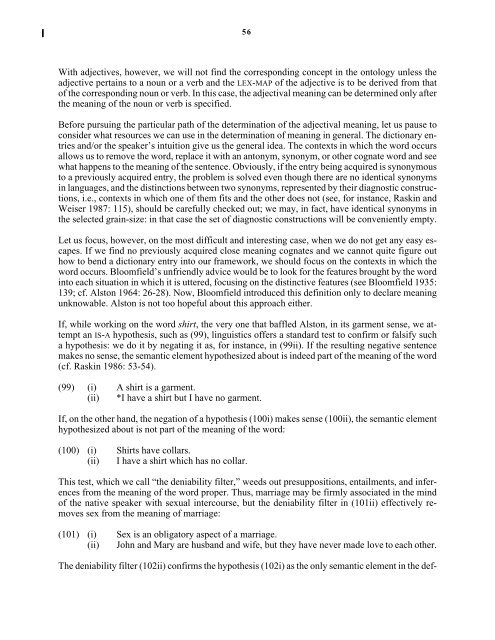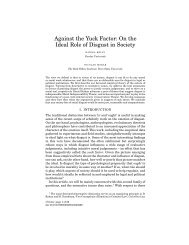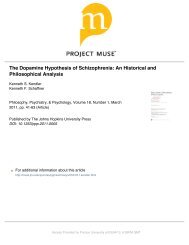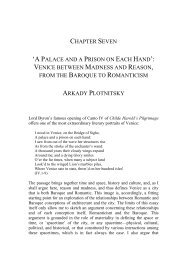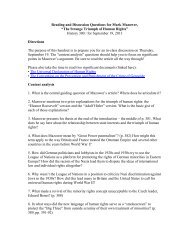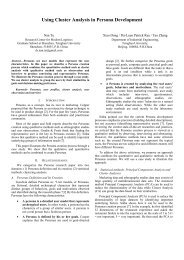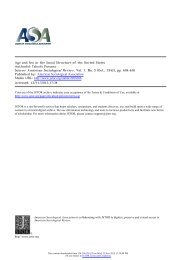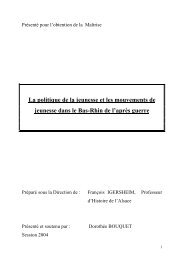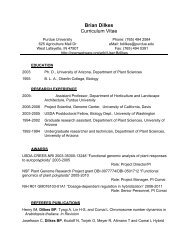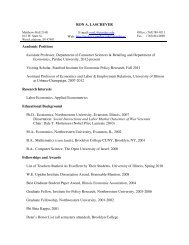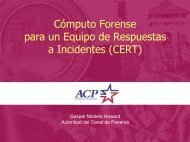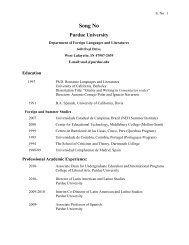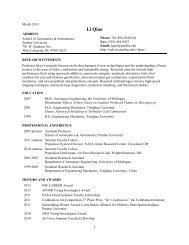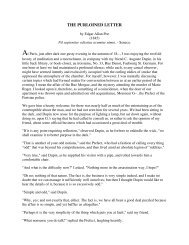Lexical Semantics of Adjectives - CiteSeerX
Lexical Semantics of Adjectives - CiteSeerX
Lexical Semantics of Adjectives - CiteSeerX
Create successful ePaper yourself
Turn your PDF publications into a flip-book with our unique Google optimized e-Paper software.
56<br />
With adjectives, however, we will not find the corresponding concept in the ontology unless the<br />
adjective pertains to a noun or a verb and the LEX-MAP <strong>of</strong> the adjective is to be derived from that<br />
<strong>of</strong> the corresponding noun or verb. In this case, the adjectival meaning can be determined only after<br />
the meaning <strong>of</strong> the noun or verb is specified.<br />
Before pursuing the particular path <strong>of</strong> the determination <strong>of</strong> the adjectival meaning, let us pause to<br />
consider what resources we can use in the determination <strong>of</strong> meaning in general. The dictionary entries<br />
and/or the speaker’s intuition give us the general idea. The contexts in which the word occurs<br />
allows us to remove the word, replace it with an antonym, synonym, or other cognate word and see<br />
what happens to the meaning <strong>of</strong> the sentence. Obviously, if the entry being acquired is synonymous<br />
to a previously acquired entry, the problem is solved even though there are no identical synonyms<br />
in languages, and the distinctions between two synonyms, represented by their diagnostic constructions,<br />
i.e., contexts in which one <strong>of</strong> them fits and the other does not (see, for instance, Raskin and<br />
Weiser 1987: 115), should be carefully checked out; we may, in fact, have identical synonyms in<br />
the selected grain-size: in that case the set <strong>of</strong> diagnostic constructions will be conveniently empty.<br />
Let us focus, however, on the most difficult and interesting case, when we do not get any easy escapes.<br />
If we find no previously acquired close meaning cognates and we cannot quite figure out<br />
how to bend a dictionary entry into our framework, we should focus on the contexts in which the<br />
word occurs. Bloomfield’s unfriendly advice would be to look for the features brought by the word<br />
into each situation in which it is uttered, focusing on the distinctive features (see Bloomfield 1935:<br />
139; cf. Alston 1964: 26-28). Now, Bloomfield introduced this definition only to declare meaning<br />
unknowable. Alston is not too hopeful about this approach either.<br />
If, while working on the word shirt, the very one that baffled Alston, in its garment sense, we attempt<br />
an IS-A hypothesis, such as (99), linguistics <strong>of</strong>fers a standard test to confirm or falsify such<br />
a hypothesis: we do it by negating it as, for instance, in (99ii). If the resulting negative sentence<br />
makes no sense, the semantic element hypothesized about is indeed part <strong>of</strong> the meaning <strong>of</strong> the word<br />
(cf. Raskin 1986: 53-54).<br />
(99) (i) A shirt is a garment.<br />
(ii) *I have a shirt but I have no garment.<br />
If, on the other hand, the negation <strong>of</strong> a hypothesis (100i) makes sense (100ii), the semantic element<br />
hypothesized about is not part <strong>of</strong> the meaning <strong>of</strong> the word:<br />
(100) (i) Shirts have collars.<br />
(ii) I have a shirt which has no collar.<br />
This test, which we call “the deniability filter,” weeds out presuppositions, entailments, and inferences<br />
from the meaning <strong>of</strong> the word proper. Thus, marriage may be firmly associated in the mind<br />
<strong>of</strong> the native speaker with sexual intercourse, but the deniability filter in (101ii) effectively removes<br />
sex from the meaning <strong>of</strong> marriage:<br />
(101) (i) Sex is an obligatory aspect <strong>of</strong> a marriage.<br />
(ii) John and Mary are husband and wife, but they have never made love to each other.<br />
The deniability filter (102ii) confirms the hypothesis (102i) as the only semantic element in the def-


